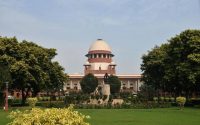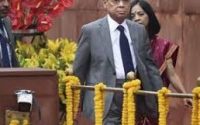Cong-ruled Chhattisgarh moves SC against NIA Act enacted by Cong-led UPA.
Source – hindustantimes.com
The Congress-led Chhattisgarh has approached the Supreme Court to challenge the validity of the National Investigation Agency Act that was hurriedly drafted by the previous Congress-led UPA after the 26/11 Mumbai terror attacks.
P Chidambaram, who was brought in as home minister after the 2008 terror attacks, had pushed for creation of India’s first federal counter-terror probe agency with powers to supersede the state police in the investigation and trial of terror-related offences.
The legal challenge has been filed by the Chhattisgarh government’s lawyer Sumeer Sodhi under Article 131 of the Constitution that empowers the Supreme Court to decide disputes between the central government and states.
Chhattisgarh’s challenge to the NIA Act comes days after Kerala approached the top court against the amended citizenship law.
Chattisgarh submitted that NIA Act takes away the powers of state government to conduct investigation through the police and confers unfettered powers on the central government to investigate offences listed as scheduled offences under the NIA Act.
Moreover, it argued, there are no rules governing the exercise of power which gives ample discretion to the Centre to exercise its power at any juncture without providing any reason or justification for the same.
“The scheme of NIA Act is such that once brought in motion, it completely takes away the power of plaintiff to investigate the offences which have been categorised as scheduled offence under the NIA Act and which has been committed within the jurisdiction of the state”, the petition stated.
Chhattisgarh argued that the NIA Act does not have any provision for coordination between the Centre and state or any requirement of pre-condition of consent to be taken by the Central government from the State government before commencing an investigation under this law.
The state, therefore, submitted that the Act is violative of the Constitution and goes against the federal spirit envisaged by the Constitution.
When the law came up for parliamentary approval, there were a few dissenting voices during the discussion.
Sitaram Yechury of the Communist Party of India (Marxist) had asked the government to make it mandatory to associate the State government in the investigation and trial of offences. But there wasn’t much discussion around this. The law was passed within four days of its introduction.
Many months later, P Chidambaram, the architect of the NIA Act, told then FBI Director Robert Mueller – according to a leaked US Embassy cable – that the National Investigation Agency’s powers could be challenged in the courts as violating constitutional provisions on Centre-State relations.
In the months after Parliament passed NIA Act, P Chidambaram had reportedly confided to the then US’ Federal Bureau of Investigation chief Robert Muller that he had come “perilously close to crossing constitutional limits” in empowering the NIA. Chidambaram, according to a US Embassy cable accessed via WikiLeaks, had explained to Muller India did not have the concept of a federal crime since law and order was the responsibility of the state governments.



